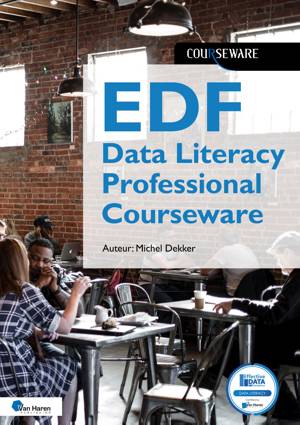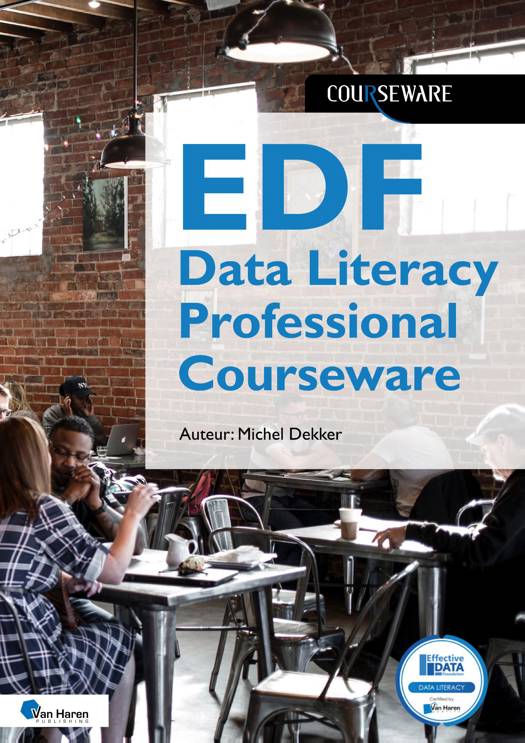
- Afhalen na 1 uur in een winkel met voorraad
- Gratis thuislevering in België vanaf € 30
- Ruim aanbod met 7 miljoen producten
- Afhalen na 1 uur in een winkel met voorraad
- Gratis thuislevering in België vanaf € 30
- Ruim aanbod met 7 miljoen producten
Zoeken
€ 86,11
+ 86 punten
Uitvoering
Omschrijving
"In order to leverage data, decision makers and management have to base their decisions on the vast amounts of information being collected and generated nowadays.
Understanding data requires a set of skills that are easy to learn, but in general are far from intuitive. None of us are born with the capacity to understand data: it is a human abstract construct, so we all need to learn how to work with it.
How data can be leveraged, what the common pitfalls are and how data can often be misinterpreted are all crucial pieces of knowledge for all modern business professionals, particularly those in management.
It is a misconception that humans no longer have a role to play and that data can make the decisions for us. However, in the foreseeable future, data-guided decisions will be the norm rather than the exception.
The EDF Certification recognizes the awareness and understanding of the components of data literacy and how to foster its adoption and application for the benefit of everybody who needs to make decisions based on data.
The EDF Certification is achieved through an exam which demonstrates that a participant:
* Understands what data is and isn't;
* Is aware of the questions that need answered whenever you receive some data;
* Understands how to summarize data in the correct way;
* Is aware of the main processes involved from data origins through to usage;
* Understands what data quality is;
* Understands how to use data in order to measure performance;
* Is aware of the impact of our expectations on data analysis;
* Understands the main human biases involved in data analysis;
* Is aware of the principal types of data analysis;
* Understands the impact of context on analysis;
* Understands how to apply storytelling principles to data arguments. "
Understanding data requires a set of skills that are easy to learn, but in general are far from intuitive. None of us are born with the capacity to understand data: it is a human abstract construct, so we all need to learn how to work with it.
How data can be leveraged, what the common pitfalls are and how data can often be misinterpreted are all crucial pieces of knowledge for all modern business professionals, particularly those in management.
It is a misconception that humans no longer have a role to play and that data can make the decisions for us. However, in the foreseeable future, data-guided decisions will be the norm rather than the exception.
The EDF Certification recognizes the awareness and understanding of the components of data literacy and how to foster its adoption and application for the benefit of everybody who needs to make decisions based on data.
The EDF Certification is achieved through an exam which demonstrates that a participant:
* Understands what data is and isn't;
* Is aware of the questions that need answered whenever you receive some data;
* Understands how to summarize data in the correct way;
* Is aware of the main processes involved from data origins through to usage;
* Understands what data quality is;
* Understands how to use data in order to measure performance;
* Is aware of the impact of our expectations on data analysis;
* Understands the main human biases involved in data analysis;
* Is aware of the principal types of data analysis;
* Understands the impact of context on analysis;
* Understands how to apply storytelling principles to data arguments. "
Specificaties
Betrokkenen
- Auteur(s):
- Uitgeverij:
Inhoud
- Taal:
- Engels
- Reeks:
Eigenschappen
- Productcode (EAN):
- 9789401809863
- Verschijningsdatum:
- 26/03/2024
- Uitvoering:
- E-book
- Beveiligd met:
- Adobe DRM
- Formaat:

Alleen bij Standaard Boekhandel
+ 86 punten op je klantenkaart van Standaard Boekhandel
Beoordelingen
We publiceren alleen reviews die voldoen aan de voorwaarden voor reviews. Bekijk onze voorwaarden voor reviews.











